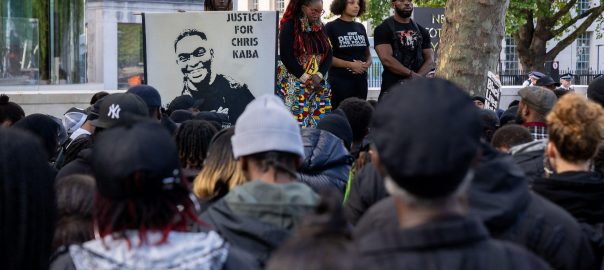Clare Torrible, University of Bristol
The inquest into the death of Chris Kaba opened on October 4 2022. Kaba, an unarmed black man, was shot and killed in Streatham Hill, south London on September 5 2022 by a Metropolitan police officer.
Whatever the outcome of this inquest, the feelings it has evoked in black communities are all too familiar. Kaba’s death comes in the wake of recent, high-profile cases that have severely shaken the trust many black people have in the police throughout the UK. These include the strip-search of Child Q in London, the manslaughter of Dalian Atkinson in Telford, and in Bristol, the tasering of Judah Adunbi, a respected community elder and former police race relations advisor.
It also sits alongside shocking statistics concerning the disproportionate use of force, and stop and search, against racialised minorities.
How disproportionate policing impacts black communities
In 2019-2020, black people in England and Wales were 5.7 times more likely to have force used on them than white people, and nine times more likely to have Tasers drawn against them. In the same year, people from racialised minorities in England and Wales were 4.1 times more likely to be stopped and searched than white people. For black people, this figure rises to 8.9 times.
Most police forces cannot adequately explain this disproportionality – despite His Majesty’s Inspectorate of Constabulary and Fire & Rescue Services issuing repeated instructions for them to improve their record-keeping.
Context is everything. If disproportionate policing is to be effectively tackled, it is vital to truly understand the depth of the fear and hurt it creates and the impact it has on the daily lives of people.
My involvement in a new documentary about Judah Adunbi’s experience at the hands of Bristol police has brought home to me the importance of recognising this context. The film, entitled I am Judah, depicts police officers tasering Adunbi in the face after mistaking him for another black man. It explores the criminal and misconduct process which exonerated both the officers involved. It also forms an active part of Adunbi’s fight for justice and change.
As a crowdfunded project, this documentary bears witness to the community’s outrage at the way Adunbi was treated, and the frustration people feel when the police are not held properly to account. It also speaks to the fear of ongoing harassment and arbitrary force that disproportionate policing engenders in communities.
How police misconduct is assessed
Central to these cases is how police behaviour is assessed and when it amounts to misconduct. Police regulations stipulate that any use of force be “necessary, proportionate and reasonable in all the circumstances”. A crucial consideration here is whether what is “reasonable in all the circumstances” is judged objectively, or whether it is based on the officers’ honest belief at the time.
The court of appeal recently confirmed that it is for the misconduct tribunal to decide what was reasonable in all the circumstances. Until this ruling, officers’ honest belief was a more dominant factor.
This is a significant decision. If the test of whether police use of force amounts to misconduct centres on what the officer honestly believed, it runs the risk of not taking into account unconscious bias.
Mistaking one black man for another black man and then basing the use of force on that mistake is just one example of police behaviour that can be rooted in such bias. A misconduct system that permits honest mistakes to operate as a defence can then inadvertently reinforce that bias. In doing so, it not only means that the right lessons are not learned by the police. It also fails to reassure racialised communities that they will not be subjected to arbitrary use of force.
Research has repeatedly found a defensive and uncooperative culture within the police in relation to allegations of wrongdoing. This coincides with a tendency for internal performance and misconduct processes to meticulously gather evidence, while failing to meaningfully challenge officers’ accounts of events. A system that focuses on officers’ honest belief only serves to support this tendency.
Police stakeholders are now appealing to the supreme court over the court of appeal’s ruling. They are seeking a return to the focus on officers’ honest belief, which is concerning.
The incoming Metropolitan police commissioner Mark Rowley was appointed in September 2022, following serious concerns over police occupational culture. His refusal to confirm or deny a view on whether the Met is institutionally racist reinforces that concern.
For unconscious bias to be eradicated and the disproportionate policing it results in to be tackled, it is crucial the supreme court upholds the court of appeal’s decision. Without it, black communities’ fears will not be allayed and their confidence will not be restored.![]()
Clare Torrible, Senior Lecturer in Law, University of Bristol
This article is republished from The Conversation under a Creative Commons license. Read the original article.

